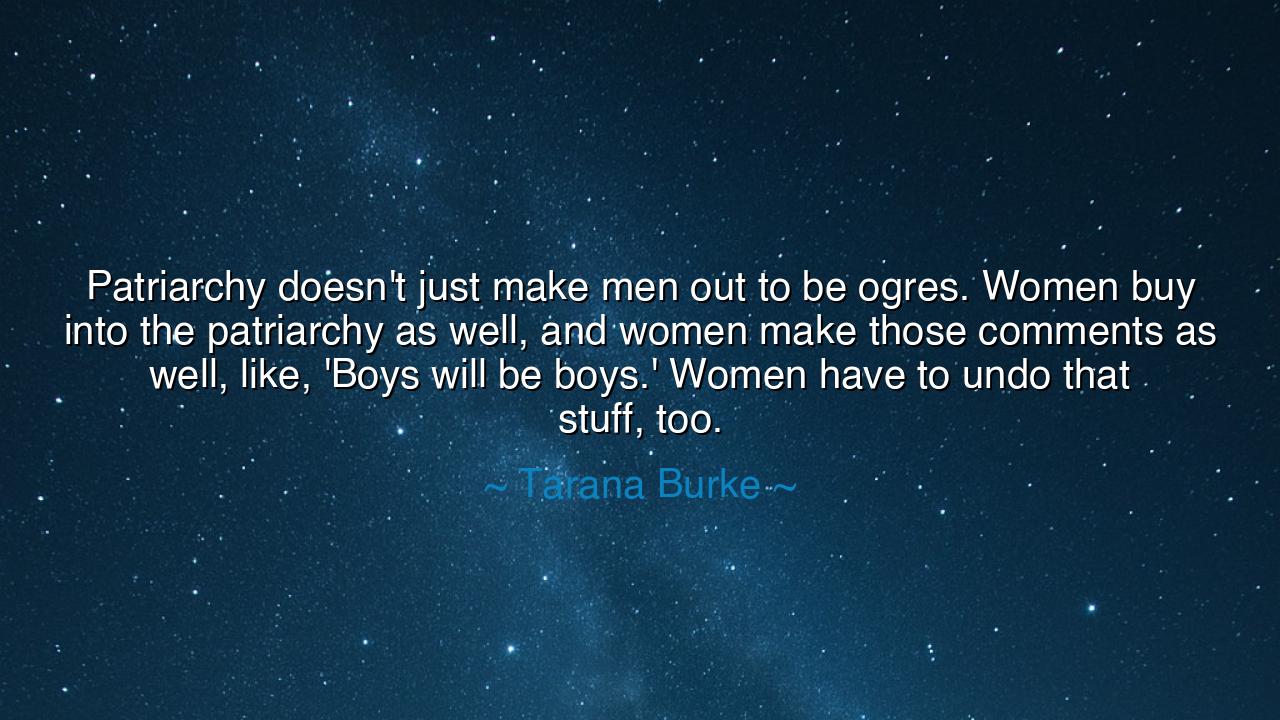
Patriarchy doesn't just make men out to be ogres. Women buy into
Patriarchy doesn't just make men out to be ogres. Women buy into the patriarchy as well, and women make those comments as well, like, 'Boys will be boys.' Women have to undo that stuff, too.






Hear, O seekers of justice, the unyielding words of Tarana Burke: “Patriarchy doesn’t just make men out to be ogres. Women buy into the patriarchy as well, and women make those comments as well, like, ‘Boys will be boys.’ Women have to undo that stuff, too.” In this saying lies the wisdom of one who has walked through the fires of struggle and borne witness to the hidden chains of oppression. She proclaims that patriarchy is not upheld by men alone, but by the silent consent and daily habits of women who, knowingly or unknowingly, repeat its laws.
For the strength of patriarchy lies not only in the might of rulers, nor in laws written by men, but in the whispers of custom, in the excuses of family, in the sayings that pass unchallenged. “Boys will be boys”—a phrase born of resignation—becomes a shield that protects misconduct, teaching sons that their actions are excused, and daughters that their pain is secondary. Thus, the system is not only imposed; it is sustained from within, by those who inherit it and pass it forward.
History bears witness to this truth. In the days of the witch trials in Europe, it was often women who accused other women, repeating the fears and judgments that patriarchal authority had planted in their hearts. They, too, became instruments of the system that oppressed them, proving Burke’s warning: that liberation requires not only resisting external chains, but unlearning the inner habits of submission and excuse.
Consider also the struggles of the civil rights movement in America. Though oppression came from the structures of white supremacy, the prejudice that sustained it was also carried in the ordinary words and behaviors of everyday people. So too with patriarchy: it survives not only in the halls of power but in the mouths of mothers, teachers, neighbors, who repeat without thinking the phrases that bind women and men alike to old roles.
Therefore, O children of the future, heed this teaching: to dismantle patriarchy, both men and women must labor together. Men must forsake privilege, but women, too, must unlearn the sayings that excuse it. Freedom is not only the breaking of outer chains, but the cleansing of inner speech and thought. Burke’s words are a call to vigilance, a reminder that the struggle is not only against others, but against the patterns within ourselves.






TAbui the anh
Burke’s comment challenges a common misconception: that patriarchy is solely a male-dominated issue. Women often play a significant role in reinforcing gender stereotypes, sometimes without realizing it. How do we begin to address this as a society—acknowledging that patriarchy is a collective issue? What steps can be taken to encourage women to reflect on their own actions and challenge these internalized beliefs to create a more equitable world?
BN10CV2-20- Nguyen Duc Bao Ngoc
The idea that women, too, have a role in perpetuating patriarchy is a powerful but difficult concept to grasp. Women are often the ones who nurture and teach the next generation, but how often are we unintentionally reinforcing patriarchal values? How can we break free from these cycles without alienating or blaming those who are simply products of the system? What steps can women take in their own lives to dismantle these societal norms?
YNtran yen nhi
Burke’s quote brings attention to the complexities of patriarchy and its effects on both men and women. If women are complicit in perpetuating these harmful beliefs, does that mean we have all internalized aspects of patriarchy to some extent? How do we unlearn these behaviors without feeling guilt or shame for having been part of the system? What would it take for society to collectively move away from these deeply ingrained ideas?
VDNguyen Van Duc
Burke’s statement highlights an uncomfortable truth: patriarchy is not only a system that oppresses women but also one that women contribute to. The phrase 'boys will be boys' is a perfect example of how societal expectations shape our understanding of gender from an early age. How do we begin to change this narrative? What can women do to actively challenge these ingrained behaviors in themselves and others?
KNPham Khoi Nguyen
Tarana Burke’s point about women buying into patriarchy challenges the idea that only men perpetuate gender norms. It’s easy to assume that patriarchal beliefs are solely a male construct, but how often do women, whether knowingly or unknowingly, reinforce these structures? How can we create a culture where both men and women work together to dismantle harmful gender norms, especially when women may unconsciously perpetuate them in their daily lives?